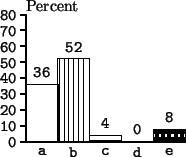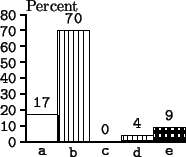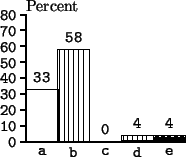|
|
|
|||||||||||||||
|
|
||||||||||||||||
|
Homepage > Assessment > Logic > Question 5 |
||||||||||||||||
|
|
||||||||||||||||
|
|
Philosophy
103: Introduction to Logic
Answer Choices: a. There can be many different reasons why Richardson does not show his financial records. An interesting question is whether upper-level English students in general assess possible motives ahead of the logic of this passage. b. This answer is the safest and best conclusion. c. The choice here would illustrate a student answering the question by trusting the basis of a prior belief that politicians are not honest more than trusting any logical inference from the passage itself. d. This choice represents a student believing the conclusion follows with certainty--a rather serious logical error. e. Again, this answer would represent trusting a prior prejudice rather than a close examination of what is said. Evaluation: The answers to this question are not consistent across upper-level English; however, logic and freshman English are comparable. This type of question quite probably will show a difference in assessment outcomes between logic and upper-level English. |
||||||||||||||
|
Send corrections or suggestions to webmaster@philosophy.lander.edu |
||||||||||||||||
|
Arguments | Language | Fallacies | Propositions | Syllogisms | Translation | Symbolic |
||||||||||||||||
|
|
. |
|
||||||||||||||



